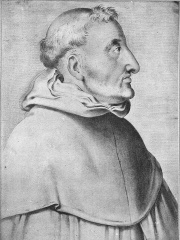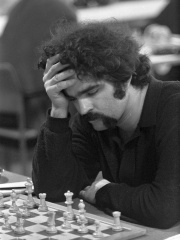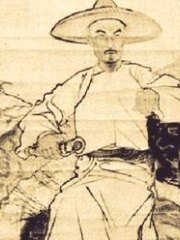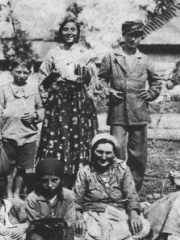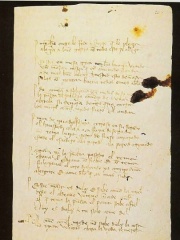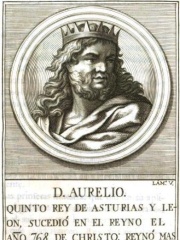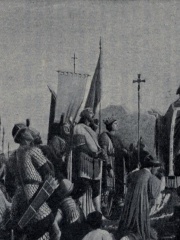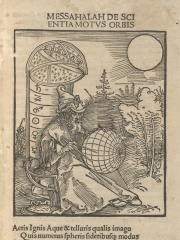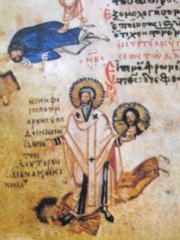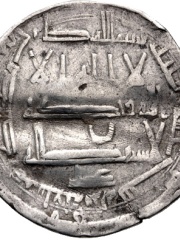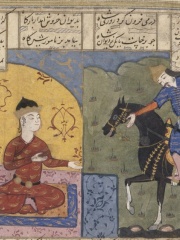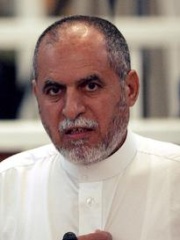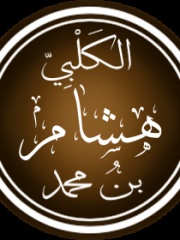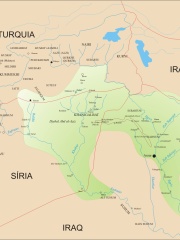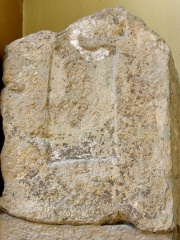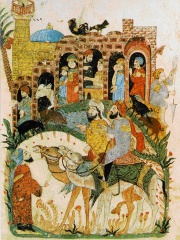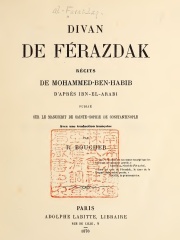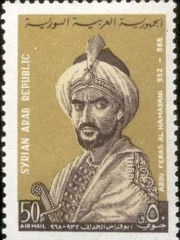WRITER
Al-Asmaʿi
740 - 828

 Al-Asmaʿi
Al-Asmaʿi
Al-Asmaʿi (أبو سعيد عبد الملك ابن قريب الأصمعي, ʿAbd al-Malik ibn Qurayb al-Aṣmaʿī ; c. 740–828/833), or Asmai was an Arab philologist and one of three leading Arabic grammarians of the Basra school. At the court of the Abbasid caliph, Hārūn al-Rashīd, as polymath and prolific author on philology, poetry, genealogy, and natural science, he pioneered zoology studies in animal-human anatomical science. He compiled an important poetry anthology, the Asma'iyyat, and was credited with composing an epic on the life of Antarah ibn Shaddad. A protégé of Al-Khalil ibn Ahmad al-Farahidi and Abu 'Amr ibn al-'Ala', he was a contemporary and rival of Abū ʿUbaidah and Sibawayhi also of the Basran school. Read more on Wikipedia
His biography is available in 19 different languages on Wikipedia (up from 17 in 2024). Al-Asmaʿi is the 3,055th most popular writer (down from 2,546th in 2024), the 255th most popular biography from Iraq (down from 231st in 2019) and the 19th most popular Iraqi Writer.
Memorability Metrics
Page views of Al-Asmaʿi by language
Among WRITERS
Among writers, Al-Asmaʿi ranks 3,055 out of 7,302. Before him are Àngel Guimerà, Louis of Granada, Sigurd Hoel, Tim Krabbé, Wu Jingzi, and Alda Merini. After him are Bronisława Wajs, Charlotte Smith, Jules Barbier, Juan Ruiz, Carlos Drummond de Andrade, and Maksim Bahdanovič.
Most Popular Writers in Wikipedia
Go to all RankingsÀngel Guimerà
1845 - 1924
HPI: 60.24
Rank: 3,049
Louis of Granada
1504 - 1588
HPI: 60.23
Rank: 3,050
Sigurd Hoel
1890 - 1960
HPI: 60.23
Rank: 3,051
Tim Krabbé
1943 - Present
HPI: 60.23
Rank: 3,052
Wu Jingzi
1701 - 1754
HPI: 60.23
Rank: 3,053
Alda Merini
1931 - 2009
HPI: 60.23
Rank: 3,054
Al-Asmaʿi
740 - 828
HPI: 60.22
Rank: 3,055
Bronisława Wajs
1908 - 1987
HPI: 60.22
Rank: 3,056
Charlotte Smith
1749 - 1806
HPI: 60.22
Rank: 3,057
Jules Barbier
1825 - 1901
HPI: 60.22
Rank: 3,058
Juan Ruiz
1283 - 1350
HPI: 60.22
Rank: 3,059
Carlos Drummond de Andrade
1902 - 1987
HPI: 60.22
Rank: 3,060
Maksim Bahdanovič
1891 - 1917
HPI: 60.20
Rank: 3,061
Contemporaries
Among people born in 740, Al-Asmaʿi ranks 5. Before him are Aurelius of Asturias, Paulinus II of Aquileia, Kamalaśīla, and Mashallah ibn Athari. After him are Vineh of Bulgaria, Angilbert, and Adalgis. Among people deceased in 828, Al-Asmaʿi ranks 3. Before him are Nikephoros I of Constantinople, and Asad ibn al-Furat. After him is Idris II of Morocco.
Others Born in 740
Go to all RankingsAurelius of Asturias
POLITICIAN
740 - 774
HPI: 65.51
Rank: 1
Paulinus II of Aquileia
WRITER
740 - 802
HPI: 63.66
Rank: 2
Kamalaśīla
WRITER
740 - 795
HPI: 61.60
Rank: 3
Mashallah ibn Athari
ASTRONOMER
740 - 815
HPI: 60.41
Rank: 4
Al-Asmaʿi
WRITER
740 - 828
HPI: 60.22
Rank: 5
Vineh of Bulgaria
POLITICIAN
740 - 762
HPI: 59.14
Rank: 6
Angilbert
RELIGIOUS FIGURE
740 - 814
HPI: 59.11
Rank: 7
Adalgis
POLITICIAN
740 - 788
HPI: 58.55
Rank: 8
Others Deceased in 828
Go to all RankingsNikephoros I of Constantinople
RELIGIOUS FIGURE
758 - 828
HPI: 69.71
Rank: 1
Asad ibn al-Furat
LAWYER
759 - 828
HPI: 61.19
Rank: 2
Al-Asmaʿi
WRITER
740 - 828
HPI: 60.22
Rank: 3
Idris II of Morocco
POLITICIAN
791 - 828
HPI: 59.29
Rank: 4
In Iraq
Among people born in Iraq, Al-Asmaʿi ranks 255 out of 384. Before him are Al-Mundhir III ibn al-Nu'man (500), Muqtada al-Sadr (1974), Ikunum (-1900), Mashallah ibn Athari (740), Awad Hamed al-Bandar (1945), and Ishaq ibn Hunayn (830). After him are Hisham ibn al-Kalbi (737), Abu Sulayman Sijistani (932), Enlil-nirari (-1400), Ashur-resh-ishi I (-1200), Eriba-Adad I (-1400), and Ibrahim ibn Sinan (908).
Others born in Iraq
Go to all RankingsAl-Mundhir III ibn al-Nu'man
POLITICIAN
500 - 554
HPI: 60.52
Rank: 249
Muqtada al-Sadr
POLITICIAN
1974 - Present
HPI: 60.45
Rank: 250
Ikunum
POLITICIAN
1900 BC - 1900 BC
HPI: 60.42
Rank: 251
Mashallah ibn Athari
ASTRONOMER
740 - 815
HPI: 60.41
Rank: 252
Awad Hamed al-Bandar
POLITICIAN
1945 - 2007
HPI: 60.41
Rank: 253
Ishaq ibn Hunayn
WRITER
830 - 910
HPI: 60.30
Rank: 254
Al-Asmaʿi
WRITER
740 - 828
HPI: 60.22
Rank: 255
Hisham ibn al-Kalbi
HISTORIAN
737 - 819
HPI: 60.13
Rank: 256
Abu Sulayman Sijistani
PHILOSOPHER
932 - 1000
HPI: 60.03
Rank: 257
Enlil-nirari
POLITICIAN
1400 BC - 1307 BC
HPI: 60.00
Rank: 258
Ashur-resh-ishi I
POLITICIAN
1200 BC - 1200 BC
HPI: 59.98
Rank: 259
Eriba-Adad I
POLITICIAN
1400 BC - 1366 BC
HPI: 59.81
Rank: 260
Ibrahim ibn Sinan
MATHEMATICIAN
908 - 946
HPI: 59.81
Rank: 261
Among WRITERS In Iraq
Among writers born in Iraq, Al-Asmaʿi ranks 19. Before him are Al-Khalil ibn Ahmad al-Farahidi (718), Al-Hariri of Basra (1054), Aphrahat (280), Al-Sharif al-Radi (970), Al-Farazdaq (641), and Ishaq ibn Hunayn (830). After him are Abu-l-'Atahiya (748), Abu Firas al-Hamdani (932), Nazik Al-Malaika (1923), Jacob of Serugh (451), Abu Isa al-Warraq (null), and Abū Hayyān al-Tawhīdī (923).
Al-Khalil ibn Ahmad al-Farahidi
718 - 790
HPI: 64.98
Rank: 13
Al-Hariri of Basra
1054 - 1122
HPI: 63.82
Rank: 14
Aphrahat
280 - 346
HPI: 62.99
Rank: 15
Al-Sharif al-Radi
970 - 1015
HPI: 62.01
Rank: 16
Al-Farazdaq
641 - 728
HPI: 61.71
Rank: 17
Ishaq ibn Hunayn
830 - 910
HPI: 60.30
Rank: 18
Al-Asmaʿi
740 - 828
HPI: 60.22
Rank: 19
Abu-l-'Atahiya
748 - 826
HPI: 59.76
Rank: 20
Abu Firas al-Hamdani
932 - 968
HPI: 59.37
Rank: 21
Nazik Al-Malaika
1923 - 2007
HPI: 59.37
Rank: 22
Jacob of Serugh
451 - 521
HPI: 58.89
Rank: 23
Abu Isa al-Warraq
HPI: 58.87
Rank: 24
Abū Hayyān al-Tawhīdī
923 - 1023
HPI: 58.12
Rank: 25

